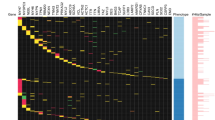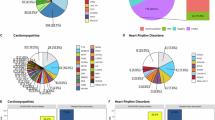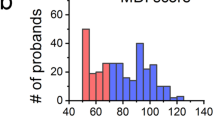Abstract
Multi-gene testing is useful in genetically heterogeneous conditions, including inherited cardiac pathologies. Increasing the number of genes analysed increases diagnostic yield of variants of certain, likely, or uncertain pathogenicity. Concerns exist regarding management of variants of uncertain/likely pathogenicity in conditions of oligogenic inheritance or variable expressivity. We surveyed a sample of colleagues across different specialties and departments internationally to compare management of patients with class 3 or class 4 variants in genes associated with non-syndromic cardiomyopathy or arrhythmia. An electronic survey regarding clinical management of variants (www.surveymonkey.com/r/cardiacvariants) was designed and distributed to colleagues internationally via professional bodies and direct email. 150 respondents (88 centres, 27 countries) completed the survey, most of whom were Clinical Geneticists or Genetic Counsellors. Most respondents offer pre-symptomatic testing to asymptomatic relatives of an individual with class 4 or class 5 variants. A minority of respondents offer pre-symptomatic testing for class 3 variants. Considering class 4 variants, 22 (15%) are fully reassuring that the patient with a negative predictive test would not develop the familial phenotype, while 123 (82%) counselled patients about the possibility of variant reclassification. Variability existed between and within centres and specialties. Multiple “free text” comments were provided. Recurring themes including need for multidisciplinary input, technical concerns, and concern regarding duty to review variants of uncertain significance. This study demonstrates that variability in management of likely pathogenic/uncertain variants exists. Close multi-disciplinary input is essential. The development of disorder or gene-specific evidence-based guidelines might ameliorate uncertainty in management.
Similar content being viewed by others
Log in or create a free account to read this content
Gain free access to this article, as well as selected content from this journal and more on nature.com
or
References
Neubauer J, Haas C, Bartsch C, Medeiros-Domingo A, Berger W. Post-mortem whole-exome sequencing (WES) with a focus on cardiac disease-associated genes in five young sudden unexplained death (SUD) cases. Int J Legal Med. 2016;130:1011–21.
Ouellette AC, Mathew J, Manickaraj AK, Manase G, Zahavich L, Wilson J, et al. Clinical genetic testing in pediatric cardiomyopathy: is bigger better? Clin Genet. 2018;93:33–40.
Cirino AL, Lakdawala NK, McDonough B, Conner L, Adler D, Weinfeld M, et al. A comparison of whole genome sequencing to multigene panel testing in hypertrophic cardiomyopathy patients. Circul Cardiovasc Genet. 2017;10:e001768.
Gómez J, Reguero JR, Coto E. The ups and downs of genetic diagnosis of hypertrophic cardiomyopathy. Rev Esp Cardiol. 2016;69:61–8.
Michels M, Soliman OI, Phefferkorn J, Hoedemaekers YM, Kofflard MJ, Dooijes D, et al. Disease penetrance and risk stratification for sudden cardiac death in asymptomatic hypertrophic cardiomyopathy mutation carriers. Eur Heart J. 2009;30:2593–8.
Christiaans I, Birnie E, van Langen IM, van Spaendonck-Zwarts KY, van Tintelen JP, van den Berg MP, et al. The yield of risk stratification for sudden cardiac death in hypertrophic cardiomyopathy myosin-binding protein C gene mutation carriers: focus on predictive screening. Eur Heart J. 2010;31:842–8.
Plon SE, Eccles DM, Easton D, Foulkes WD, Genuardi M, Greenblatt MS, et al. Sequence variant classification and reporting: recommendations for improving the interpretation of cancer susceptibility genetic test results. Hum Mutat. 2008;29:1282–91.
Richards S, Aziz N, Bale S, Bick D, Das S, Gastier-Foster J, et al. Standards and guidelines for the interpretation of sequence variants: a joint consensus recommendation of the American College of Medical Genetics and Genomics and the Association for Molecular Pathology. Genet Med. 2015;17:405–24.
Gelb BD, Cave H, Dillon MW, Gripp KW, Lee JA, Mason-Suares H, et al. ClinGen’s RASopathy Expert Panel consensus methods for variant interpretation. Genet Med. 2018;20:1334–45.
Kelly MA, Caleshu C, Morales A, Buchan J, Wolf Z, Harrison SM, et al. Adaptation and validation of the ACMG/AMP variant classification framework for MYH7-associated inherited cardiomyopathies: recommendations by ClinGen’s Inherited Cardiomyopathy Expert Panel. Genet Med. 2018;20:351–9.
Rigato I, Bauce B, Rampazzo A, Zorzi A, Pilichou K, Mazzotti E, et al. Compound and digenic heterozygosity predicts lifetime arrhythmic outcome and sudden cardiac death in desmosomal gene-related arrhythmogenic right ventricular cardiomyopathy. Circulation. 2013;6:533–42.
Easton DF, Pharoah PDP, Antoniou AC, Tischkowitz M, Tavtigian SV, Nathanson KL, et al. Gene-panel sequencing and the prediction of breast-cancer risk. N Engl J Med. 2015;372:2243–57.
Tavtigian SV, Greenblatt MS, Harrison SM, Nussbaum RL, Prabhu SA, Boucher KM, et al. Modeling the ACMG/AMP variant classification guidelines as a Bayesian classification framework. Genet Med. 2018;20:1054–60.
Andreasen C, Nielsen JB, Refsgaard L, Holst AG, Christensen AH, Andreasen L, et al. New population-based exome data are questioning the pathogenicity of previously cardiomyopathy-associated genetic variants. Eur J Hum Genet. 2013;21:918–28.
Priori SG, Napolitano C, Schwartz PJ. Low penetrance in the long-QT syndrome: clinical impact. Circulation. 1999;99:529–33.
Goldenberg I, Horr S, Moss AJ, Lopes CM, Barsheshet A, McNitt S, et al. Risk for life-threatening cardiac events in patients with genotype-confirmed long-QT syndrome and normal-range corrected QT intervals. J Am Coll Cardiol. 2011;57:51–9.
Amin AS, Wilde AAM. The future of sudden cardiac death research. Prog Pediatr Cardiol. 2017;45:49–54.
Priori SG, Wilde AA, Horie M, Cho Y, Behr ER, Berul C, et al. HRS/EHRA/APHRS expert consensus statement on the diagnosis and management of patients with inherited primary arrhythmia syndromes: document endorsed by HRS, EHRA, and APHRS in May 2013 and by ACCF, AHA, PACES, and AEPC in June 2013. Heart Rhythm. 2013;10:1932–63.
Christian S, Atallah J, Clegg R, Giuffre M, Huculak C, Dzwiniel T, et al. Uptake of predictive genetic testing and cardiac evaluation for children at risk for an inherited arrhythmia or cardiomyopathy. J Genet Couns. 2018;27:124–30.
Christiaans I, Birnie E, Bonsel GJ, Wilde AA, van Langen IM. Uptake of genetic counselling and predictive DNA testing in hypertrophic cardiomyopathy. Eur J Hum Genet. 2008;16:1201–7.
Manrai AK, Funke BH, Rehm HL, Olesen MS, Maron BA, Szolovits P, et al. Genetic misdiagnoses and the potential for health disparities. New Engl J Med. 2016;375:655–65.
McVeigh TP, Donnelly D, Al Shehhii M, Jones EA, Murray A, Wedderburn S, et al. Towards establishing consistency in triage in a tertiary specialty. Eur J Hum Genet. 2019;27:547–55.
Matthijs G, Souche E, Alders M, Corveleyn A, Eck S, Feenstra I, et al. Guidelines for diagnostic next-generation sequencing. Eur J Hum Genet. 2016;24:2–5.
van El CG, Cornel MC, Borry P, Hastings RJ, Fellmann F, Hodgson SV, et al. Whole-genome sequencing in health care. Recommendations of the European Society of Human Genetics. Eur J Hum Genet. 2013;21(Suppl. 1):S1–5.
Author information
Authors and Affiliations
Corresponding author
Ethics declarations
Conflict of interest
The authors declare that they have no conflict of interest.
Additional information
Publisher’s note: Springer Nature remains neutral with regard to jurisdictional claims in published maps and institutional affiliations.
Supplementary information
Rights and permissions
About this article
Cite this article
McVeigh, T.P., Kelly, L.J., Whitmore, E. et al. Managing uncertainty in inherited cardiac pathologies—an international multidisciplinary survey. Eur J Hum Genet 27, 1178–1185 (2019). https://doi.org/10.1038/s41431-019-0391-8
Received:
Revised:
Accepted:
Published:
Issue date:
DOI: https://doi.org/10.1038/s41431-019-0391-8
This article is cited by
-
Diagnostic yield from cardiac gene testing for inherited cardiac conditions and re-evaluation of pre-ACMG variants of uncertain significance
Irish Journal of Medical Science (1971 -) (2024)
-
Postgraduate training in Cancer Genetics—a cross-specialty survey exploring experience of clinicians in Ireland
Irish Journal of Medical Science (1971 -) (2022)
-
Diagnostic yield of a custom-designed multi-gene cancer panel in Irish patients with breast cancer
Irish Journal of Medical Science (1971 -) (2020)



